'The People Will Not Forgive This': South Korean President Faces Impeachment After Martial Law Gambit
"The Yoon Suk Yeol regime has declared its own end of power," said the Korean Confederation of Trade Unions.
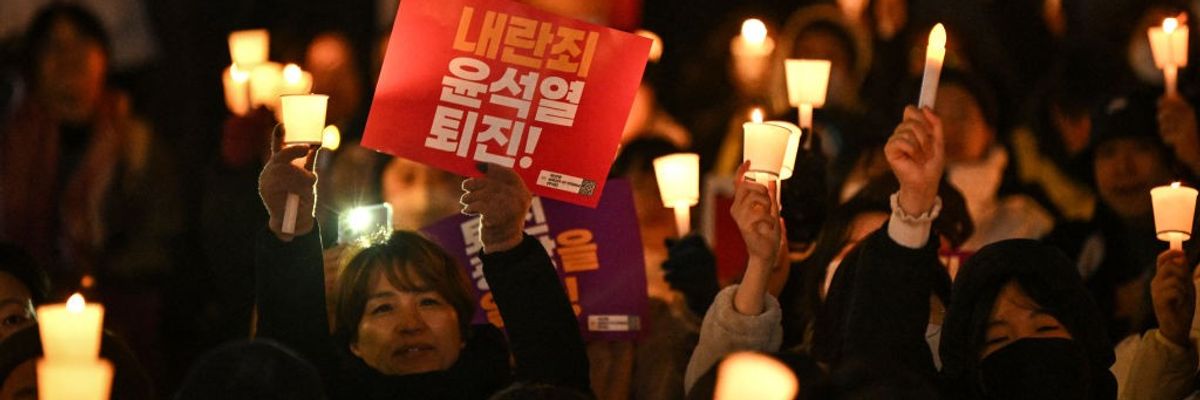
A woman holds a sign that reads "Insurrection Yoon Suk Yeol Step Down!" during a candlelight vigil to protest against the South Korean president on December 4, 2024.
(Photo: Philip Fong/AFP via Getty Images)
Jake Johnson
Dec 04, 2024
COMMON DREAMS
South Koreans took to the streets en masse Wednesday to protest conservative President Yoon Suk Yeol's brief imposition of martial law, a move that sparked an immediate political crisis and calls for his resignation or removal.
The Korean Confederation of Trade Unions (KCTU) led marches Wednesday and vowed that its 1.2-million-strong membership would strike until Yoon steps aside. Prior to Tuesday night, martial law was last imposed in South Korea more than four decades ago.
Yoon's decree prompted the resignation of his chief of staff, defense minister, and other officials.
"While the stated reason for declaring martial law is 'to eradicate pro-North Korean forces and maintain the constitutional order,' all citizens except Yoon Suk Yeol understand the true meaning of this martial law declaration," KCTU said in a statement. "Yoon Suk Yeol has chosen the irrational and anti-democratic method of martial law to extend his political life as he has been driven to the edge."
"The people will not forgive this," the labor organization added. "They remember the fate of regimes that declared martial law. The people clearly remember the end of regimes that deceived the citizens and damaged democracy. The people never forgave regimes that suppressed citizens and violated democracy. The Yoon Suk Yeol regime has declared its own end of power."
Just hours after issuing it, Yoon withdrew the martial law order in the face of large-scale backlash from the public and members of South Korea's Legislature, who are now looking to impeach the president after unanimously rejecting his ill-fated declaration.
The Financial Timesreported Wednesday that "about 190 lawmakers from six opposition parties submitted an impeachment motion, intending to discuss the bill in parliament on Thursday before a vote on Friday or Saturday." For impeachment to succeed, some members of Yoon's party would have to support the president's removal.
"As pressure built on members of Yoon's own party to support the impeachment bid, thousands of protesters against the president gathered in central Seoul," FT observed. "South Korea's main opposition, the Democratic Party, labeled the declaration of martial law 'a clear act of treason' and 'a perfect reason' to impeach the president."
Lee Jae-myung, the opposition party's leader, said Yoon "is likely to make another attempt" at imposing martial law if given the opportunity.
"But we face a bigger risk where he can provoke North Korea and run the risk of an armed clash with North Korea by destabilizing the divided border," he added.
Cho Kuk, leader of the Rebuilding Korea Party, said Yoon should face investigation for treason and warned the president "is someone who can press the button to start war or declare martial law again."
"He is the one who can put South Korea in the biggest jeopardy now," he said. "We should immediately suspend his presidential duties by impeaching him."
Soldiers vs office chairs: South Korea's martial law standoff
Agence France-Presse
December 4, 2024

Soldiers try to enter the main hall of the National Assembly in Seoul late Tuesday night (STR/YONHAP/AFP)
by Kang Jin-kyu
Parliamentary staffers used sofas and fire extinguishers to block soldiers armed with assault rifles and night-vision goggles from entering South Korea's National Assembly to maintain martial law, CCTV footage released Wednesday showed.
Shortly after President Yoon Suk Yeol declared martial law late Tuesday -- the first time it had been imposed in the South in over four decades -- helicopters ferried the heavily-armed troops into the compound of South Korea's parliament, the footage showed.
Other soldiers climbed over perimeter fences after midnight, Kim Min-ki, secretary general of the assembly, told reporters at a briefing, adding that they then smashed windows to enter the building in what he called an "unconstitutional and illegal" invasion.
"We will identify the physical damages and losses caused by the declaration of martial law and hold those responsible accountable through legal action," he said.
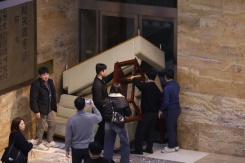
AFP Members of South Korea's Democratic Party use couches as barricades at the entrance of the National Assembly building
About 280 soldiers entered the parliament building, he said, but quickly encountered resistance from staffers, who grabbed anything on hand to barricade entrance ways and prevent the troops from reaching lawmakers in the debating chamber.
Footage showed dozens of soldiers attempting to enter the building, only to be pulled away by protesters.
"We are currently assessing the injuries sustained by several individuals, including parliamentary staff, during clashes with the martial law troops," Kim said.
The soldiers "illegally sealed off the National Assembly after declaring martial law, violating the Constitution and the law by barring lawmakers from entering," he said.
"They also trampled on the parliament building using military force, inflicting deep wounds on the hearts of the people," he added.
- Struggle over a gun -
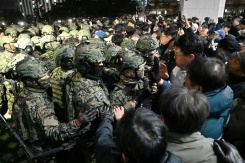
AFP Soldiers try to enter the National Assembly after South Korean President Yoon Suk Yeol declared martial law
In one dramatic scene, An Gwi-ryeong, a spokeswoman for the opposition Democratic Party, scuffled with a soldier, attempting to seize his rifle.
The struggle lasted more than 10 seconds. After she released the weapon, the soldier briefly pointed it at her.
Undeterred, An, a former news anchor, shouted: "Aren't you ashamed of yourself?" footage of the incident showed.
"I had no choice but to stop them from entering the main building because a resolution was being submitted to block the martial law," An told AFP Wednesday.
Under South Korea's constitution, if parliament requests martial law be lifted, the president is obliged to comply, and experts have speculated the soldiers were sent in a bid to stop the vote from taking place.
"I did fear for my life," she said of the confrontation.
"But I felt I had to stop them no matter what... because I could not comprehend the presence of fully armed soldiers inside the parliament."
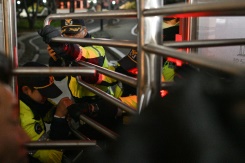
AFP Police attempted to seal off the assembly gates, barring MPs from entering the premises
While the soldiers in the compound attempted to breach the building, police were sealing off the assembly gates, attempting to bar MPs from entering.
"Some MPs had to climb over the fence to get inside to vote on the resolution," opposition MP Shin Chang-sik told AFP.
Not all MPs managed to enter the assembly. Lee Jun-seok, another opposition lawmaker, was stopped by rows of police guarding the gates.
"You are now obstructing the official duties of a lawmaker," Lee can be heard shouting in the footage -- but he was still not allowed in.
- 'Go home, you bastards!' -
Once soldiers had made it into parliament, they found the doorways to the main chamber barricaded with piles of furniture erected by parliamentary staff, CCTV footage showed.

AFP South Korean National Assembly Speaker Woo Won-shik (C top) passes a resolution demanding the immediate lifting of martial law
The video shows soldiers rushing towards the barricaded gate with guns pointed at the unarmed staffers, who continued to pile office chairs and desks in their path.
"Go home, you bastards!" shouted one staff member, as another protester unleashed a fire extinguisher in the direction of the soldiers,.
Behind the throngs of staff were scores of flashing cameras, capturing the surreal moment.
It was not until after the resolution calling for the withdrawal of martial law passed at around 1 am (1600 GMT) that the soldiers began to retreat.
They completed their withdrawal by 2 am, leaving behind shattered windows and broken furniture, but without a single shot fired.
"I was so incensed I couldn't sleep a wink last night, I came out to make sure we push out Yoon once and for all," 50-year-old Kim Min-ho told AFP at a protest at the assembly Wednesday.
"How can something like this happen in the 21st century?" Park Su-hyung, 39, said.
"I'm here out of fear our democracy will be trampled if we keep Yoon in office a moment longer"
© Agence France-Presse
Agence France-Presse
December 4, 2024

Soldiers try to enter the main hall of the National Assembly in Seoul late Tuesday night (STR/YONHAP/AFP)
by Kang Jin-kyu
Parliamentary staffers used sofas and fire extinguishers to block soldiers armed with assault rifles and night-vision goggles from entering South Korea's National Assembly to maintain martial law, CCTV footage released Wednesday showed.
Shortly after President Yoon Suk Yeol declared martial law late Tuesday -- the first time it had been imposed in the South in over four decades -- helicopters ferried the heavily-armed troops into the compound of South Korea's parliament, the footage showed.
Other soldiers climbed over perimeter fences after midnight, Kim Min-ki, secretary general of the assembly, told reporters at a briefing, adding that they then smashed windows to enter the building in what he called an "unconstitutional and illegal" invasion.
"We will identify the physical damages and losses caused by the declaration of martial law and hold those responsible accountable through legal action," he said.
AFP Members of South Korea's Democratic Party use couches as barricades at the entrance of the National Assembly building
About 280 soldiers entered the parliament building, he said, but quickly encountered resistance from staffers, who grabbed anything on hand to barricade entrance ways and prevent the troops from reaching lawmakers in the debating chamber.
Footage showed dozens of soldiers attempting to enter the building, only to be pulled away by protesters.
"We are currently assessing the injuries sustained by several individuals, including parliamentary staff, during clashes with the martial law troops," Kim said.
The soldiers "illegally sealed off the National Assembly after declaring martial law, violating the Constitution and the law by barring lawmakers from entering," he said.
"They also trampled on the parliament building using military force, inflicting deep wounds on the hearts of the people," he added.
- Struggle over a gun -
AFP Soldiers try to enter the National Assembly after South Korean President Yoon Suk Yeol declared martial law
In one dramatic scene, An Gwi-ryeong, a spokeswoman for the opposition Democratic Party, scuffled with a soldier, attempting to seize his rifle.
The struggle lasted more than 10 seconds. After she released the weapon, the soldier briefly pointed it at her.
Undeterred, An, a former news anchor, shouted: "Aren't you ashamed of yourself?" footage of the incident showed.
"I had no choice but to stop them from entering the main building because a resolution was being submitted to block the martial law," An told AFP Wednesday.
Under South Korea's constitution, if parliament requests martial law be lifted, the president is obliged to comply, and experts have speculated the soldiers were sent in a bid to stop the vote from taking place.
"I did fear for my life," she said of the confrontation.
"But I felt I had to stop them no matter what... because I could not comprehend the presence of fully armed soldiers inside the parliament."
AFP Police attempted to seal off the assembly gates, barring MPs from entering the premises
While the soldiers in the compound attempted to breach the building, police were sealing off the assembly gates, attempting to bar MPs from entering.
"Some MPs had to climb over the fence to get inside to vote on the resolution," opposition MP Shin Chang-sik told AFP.
Not all MPs managed to enter the assembly. Lee Jun-seok, another opposition lawmaker, was stopped by rows of police guarding the gates.
"You are now obstructing the official duties of a lawmaker," Lee can be heard shouting in the footage -- but he was still not allowed in.
- 'Go home, you bastards!' -
Once soldiers had made it into parliament, they found the doorways to the main chamber barricaded with piles of furniture erected by parliamentary staff, CCTV footage showed.
AFP South Korean National Assembly Speaker Woo Won-shik (C top) passes a resolution demanding the immediate lifting of martial law
The video shows soldiers rushing towards the barricaded gate with guns pointed at the unarmed staffers, who continued to pile office chairs and desks in their path.
"Go home, you bastards!" shouted one staff member, as another protester unleashed a fire extinguisher in the direction of the soldiers,.
Behind the throngs of staff were scores of flashing cameras, capturing the surreal moment.
It was not until after the resolution calling for the withdrawal of martial law passed at around 1 am (1600 GMT) that the soldiers began to retreat.
They completed their withdrawal by 2 am, leaving behind shattered windows and broken furniture, but without a single shot fired.
"I was so incensed I couldn't sleep a wink last night, I came out to make sure we push out Yoon once and for all," 50-year-old Kim Min-ho told AFP at a protest at the assembly Wednesday.
"How can something like this happen in the 21st century?" Park Su-hyung, 39, said.
"I'm here out of fear our democracy will be trampled if we keep Yoon in office a moment longer"
© Agence France-Presse
Yoon’s martial law debacle a throwback to South Korea’s history of military rule
South Korean President Yoon Suk Yeol’s short-lived proclamation of martial law this week marked the first time a South Korean leader took such a drastic measure since the country became a fully functioning democracy more than 35 years ago.
Issued on: 04/12/2024
By: FRANCE 24
Video by: Selina SYKES


South Korean President Yoon Suk Yeol’s short-lived proclamation of martial law this week marked the first time a South Korean leader took such a drastic measure since the country became a fully functioning democracy more than 35 years ago.
Issued on: 04/12/2024
By: FRANCE 24
Video by: Selina SYKES

01:52
South Korean student demonstrators demand the lifting of martial law at a protest in May 1980. © AP file photo
South Korea's President Yoon Suk Yeol faced parliamentary moves to impeach him on Wednesday after he sent heavily armed forces into Seoul's streets with a baffling and sudden declaration of martial law that harked back to the country’s past dictatorships.
Opposition parties submitted the impeachment motion just hours after parliament unanimously voted to cancel Yoon's declaration, forcing him to lift martial law about six hours after it began.
Read moreSouth Korea's Yoon faces impeachment over shock martial law order
During the tense and shocking hours under martial law, heavily armed forces surrounded the parliament, backed by army helicopters and armored vehicles. Lawmakers climbed walls to get into the building and held off troops by activating fire extinguishers. Politician and former news anchor Ahn Gwi-ryeong tried to pull away an assault rifle that a soldier had pointed at her chest as she shouted: “Aren’t you ashamed of yourselves?”

South Korea's President Yoon Suk Yeol faced parliamentary moves to impeach him on Wednesday after he sent heavily armed forces into Seoul's streets with a baffling and sudden declaration of martial law that harked back to the country’s past dictatorships.
Opposition parties submitted the impeachment motion just hours after parliament unanimously voted to cancel Yoon's declaration, forcing him to lift martial law about six hours after it began.
Read moreSouth Korea's Yoon faces impeachment over shock martial law order
During the tense and shocking hours under martial law, heavily armed forces surrounded the parliament, backed by army helicopters and armored vehicles. Lawmakers climbed walls to get into the building and held off troops by activating fire extinguishers. Politician and former news anchor Ahn Gwi-ryeong tried to pull away an assault rifle that a soldier had pointed at her chest as she shouted: “Aren’t you ashamed of yourselves?”

Opposition lawmakers stage a protest against South Korean President Yoon Suk Yeol at the National Assembly in Seoul on December 4, 2024. © Ahn Young-joon, AP
Yoon ordered martial law without warning in a speech late Tuesday where he vowed to eliminate “anti-state” forces he said were plotting rebellion and accused the main opposition parties of supporting the country’s rival, North Korea. He gave no direct evidence when he raised the spectre of North Korea as a destabilising force.
In the late 1980s, South Korea had a series of strongmen who repeatedly invoked North Korea when struggling to control domestic dissidents and political opponents.
Following Yoon’s shock announcement, there were immediate claims that the emergency declaration was linked to the political struggles of an unpopular president who has been at a loggerheads with a hostile parliament and is mired in an influence-peddling scandal involving him and his wife.

Yoon ordered martial law without warning in a speech late Tuesday where he vowed to eliminate “anti-state” forces he said were plotting rebellion and accused the main opposition parties of supporting the country’s rival, North Korea. He gave no direct evidence when he raised the spectre of North Korea as a destabilising force.
In the late 1980s, South Korea had a series of strongmen who repeatedly invoked North Korea when struggling to control domestic dissidents and political opponents.
Following Yoon’s shock announcement, there were immediate claims that the emergency declaration was linked to the political struggles of an unpopular president who has been at a loggerheads with a hostile parliament and is mired in an influence-peddling scandal involving him and his wife.

01:41
South Korea became a democracy only in the late 1980s, and military intervention in civilian affairs is still a touchy subject.
South Korea became a democracy only in the late 1980s, and military intervention in civilian affairs is still a touchy subject.
During the dictatorships that emerged as the country rebuilt from the 1950-53 Korean War, leaders occasionally proclaimed martial law that allowed them to station combat soldiers, tanks and armored vehicles on streets or in public places to prevent anti-government demonstrations.
Such scenes are unimaginable for many today.
Dictator Park Chung-hee, who ruled South Korea for nearly 20 years before he was assassinated by his spy chief in 1979, led several thousand troops into Seoul in the early hours of May 16, 1961, in the country’s first coup. He proclaimed martial law several times to stop protests and jail critics.
Such scenes are unimaginable for many today.
Dictator Park Chung-hee, who ruled South Korea for nearly 20 years before he was assassinated by his spy chief in 1979, led several thousand troops into Seoul in the early hours of May 16, 1961, in the country’s first coup. He proclaimed martial law several times to stop protests and jail critics.

South Korean troops round up demonstrators after a brutal crackdown on pro-democracy protests in Gwangju on May 27, 2024. © Sadayuki Mikami, AP
Less than two months after Park’s death, Maj. Gen. Chun Doo-hwan led tanks and troops into Seoul in December 1979 in the country’s second coup. The next year, he orchestrated a brutal military crackdown on a pro-democracy uprising in the southern city of Gwangju, killing at least 200 people.
In the summer of 1987, massive street protests forced Chun’s government to accept direct presidential elections. His army buddy Roh Tae-woo, who had joined Chun’s 1979 coup, won the election held later in 1987 thanks largely to divided votes among liberal opposition candidates.
(FRANCE 24 with AP)
Less than two months after Park’s death, Maj. Gen. Chun Doo-hwan led tanks and troops into Seoul in December 1979 in the country’s second coup. The next year, he orchestrated a brutal military crackdown on a pro-democracy uprising in the southern city of Gwangju, killing at least 200 people.
In the summer of 1987, massive street protests forced Chun’s government to accept direct presidential elections. His army buddy Roh Tae-woo, who had joined Chun’s 1979 coup, won the election held later in 1987 thanks largely to divided votes among liberal opposition candidates.
(FRANCE 24 with AP)
South Korean President Forced to Rescind Right-Wing Martial Law Declaration
The scandal-plagued far right leader declared a need to protect the country from “communist” and “anti-state” forces.
By Sharon Zhang ,
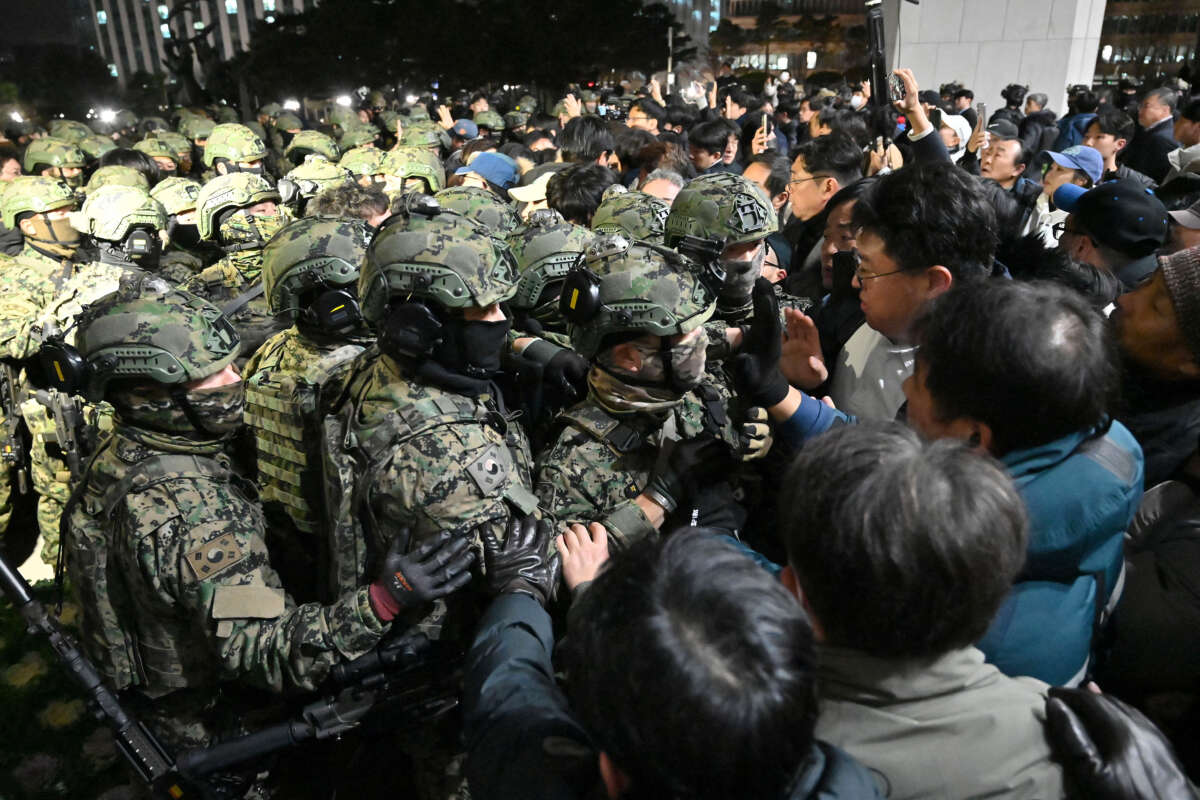
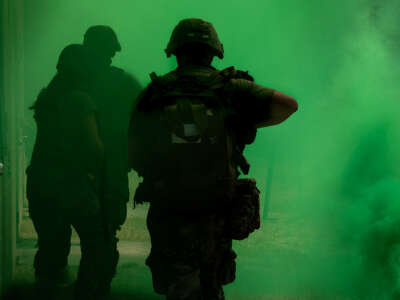
Trump’s Mass Deportation Plan Can’t Happen If US Military Members Resist It
Trump plans to use the military to enact the mass deportation of immigrants. As a veteran, I know orders can be refused. By Rory Fanning , Truthout November 22, 2024
But then, just about six hours after Yoon’s surprise television conference, he rescinded his declaration, citing the National Assembly’s vote. It was the first time martial law had been declared in South Korea since 1980, when it was declared under a fascist dictatorship propped up in part by the U.S.
Yoon is a scandal-plagued far right leader who has massively expanded the oppressive security state within the country since he was narrowly elected in 2022. President Joe Biden has been criticized for his warm relationship with Yoon, saying he is a “great friend” and maintaining diplomatic relations. The Biden administration refused to condemn the martial law declaration on Tuesday, only expressing “concern” over “developments we are seeing on the ground,” as a White House spokesperson said.
“Certainly it is our hope and expectation that the laws and regulations of a particular country are abided by that particular country,” said State Department deputy spokesperson Vedant Patel at a news briefing. “Ultimately, we want to see these political disputes resolved peacefully and in accordance with the rule of law. And of course, such a vote in the legislature would be consistent with that approach.”
Yoon had already faced mass calls to resign prior to Tuesday, facing accusations of abusing his veto power to advance his own interests, including vetoing a bill to investigate his wife for allegations of stock manipulation; legislation to investigate a 2022 crowd crush that killed 159 people in Seoul; and a bill to probe the death of a marine seemingly caused by negligence within the military.
The scandal-plagued far right leader declared a need to protect the country from “communist” and “anti-state” forces.
By Sharon Zhang ,
December 3, 2024

Soldiers try to enter the National Assembly building in Seoul on December 4, 2024, after South Korea President Yoon Suk Yeol declared martial law.
Jung Yeon-je / AFP via Getty Images
South Korea’s right-wing president, Yoon Suk Yeol, suddenly declared martial law across the country on Tuesday and then swiftly rescinded it after the self-declared anti-communist power grab was unanimously rejected by parliament and sparked a public mass uprising.
Late Tuesday evening, Yoon declared martial law, saying that there is a need to protect the country from “communist forces” and to eliminate “anti-state forces.” The decree prohibited all political activities, put all news publications under control of martial law and banned all labor activities like strikes or work slowdowns.
Members of the National Assembly, South Korea’s parliament, rushed to the chamber after the declaration, with one lawmaker saying that he had to climb over a wall to get past police and military who were blocking the building. Less than three hours after it was declared, parliament voted, 190 to 0, to reverse the edict.
Meanwhile, protests erupted in Seoul after the declaration. The Korean Confederation of Trade Unions, one of South Korea’s largest unions with over 1 million members, called for an “indefinite general strike” until Yoon resigned.
Even though the parliament voted to undo the declaration, military officials had reportedly pledged to continue enforcing it until the president lifted it, according to South Korean news channel YTN.
Related Story
South Korea’s right-wing president, Yoon Suk Yeol, suddenly declared martial law across the country on Tuesday and then swiftly rescinded it after the self-declared anti-communist power grab was unanimously rejected by parliament and sparked a public mass uprising.
Late Tuesday evening, Yoon declared martial law, saying that there is a need to protect the country from “communist forces” and to eliminate “anti-state forces.” The decree prohibited all political activities, put all news publications under control of martial law and banned all labor activities like strikes or work slowdowns.
Members of the National Assembly, South Korea’s parliament, rushed to the chamber after the declaration, with one lawmaker saying that he had to climb over a wall to get past police and military who were blocking the building. Less than three hours after it was declared, parliament voted, 190 to 0, to reverse the edict.
Meanwhile, protests erupted in Seoul after the declaration. The Korean Confederation of Trade Unions, one of South Korea’s largest unions with over 1 million members, called for an “indefinite general strike” until Yoon resigned.
Even though the parliament voted to undo the declaration, military officials had reportedly pledged to continue enforcing it until the president lifted it, according to South Korean news channel YTN.
Related Story

Trump’s Mass Deportation Plan Can’t Happen If US Military Members Resist It
Trump plans to use the military to enact the mass deportation of immigrants. As a veteran, I know orders can be refused. By Rory Fanning , Truthout November 22, 2024
But then, just about six hours after Yoon’s surprise television conference, he rescinded his declaration, citing the National Assembly’s vote. It was the first time martial law had been declared in South Korea since 1980, when it was declared under a fascist dictatorship propped up in part by the U.S.
Yoon is a scandal-plagued far right leader who has massively expanded the oppressive security state within the country since he was narrowly elected in 2022. President Joe Biden has been criticized for his warm relationship with Yoon, saying he is a “great friend” and maintaining diplomatic relations. The Biden administration refused to condemn the martial law declaration on Tuesday, only expressing “concern” over “developments we are seeing on the ground,” as a White House spokesperson said.
“Certainly it is our hope and expectation that the laws and regulations of a particular country are abided by that particular country,” said State Department deputy spokesperson Vedant Patel at a news briefing. “Ultimately, we want to see these political disputes resolved peacefully and in accordance with the rule of law. And of course, such a vote in the legislature would be consistent with that approach.”
Yoon had already faced mass calls to resign prior to Tuesday, facing accusations of abusing his veto power to advance his own interests, including vetoing a bill to investigate his wife for allegations of stock manipulation; legislation to investigate a 2022 crowd crush that killed 159 people in Seoul; and a bill to probe the death of a marine seemingly caused by negligence within the military.
No comments:
Post a Comment